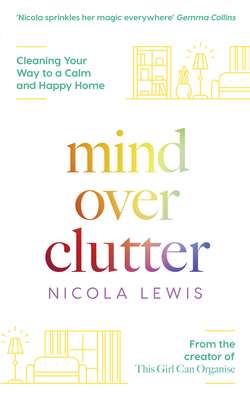Читать книгу Mind Over Clutter - Nicola Lewis, Nicola Lewis - Страница 10
1: Tidy Home, Tidy Mind I love to have a clear, clutter-free space. Getting rid of all the clutter really is transforming and helps to clear my mind as well as the room I’m in, making me feel calmer and more relaxed; so ‘tidy home, tidy mind’ makes a lot of sense to me.
ОглавлениеDecluttering gives you more time for yourself and your family and leads to a healthier and more balanced you. And although a clean environment won’t necessarily solve all your problems, it can have an enormous impact on your emotional wellbeing and outlook and make all the difference to your life.
What is ‘Clutter’?
Clutter means different things to different people, but it’s basically all about filling a space with an untidy and chaotic collection of things. It might happen for a positive reason, such as when you’re moving house or you’re decorating or renovating, or it may build up almost imperceptibly over time. If you find that you have to move things around in your home to accomplish a simple chore, or you feel that you’re drowning in ‘stuff’ and overwhelmed by all the space it takes up, then the likelihood is that you have a clutter problem.
Clutter and Mental Health
Your surroundings can have a dramatic effect on your mood, negatively impacting on your mental health – especially if you’re stressed, under pressure or just struggling with the daily grind. Having unnecessary clutter lying around can act like a visual noise, each item potentially triggering an alarm bell in your head. The truth is that most of us have so much stuff either lying around in full view or shoved inside cupboards that it’s sometimes impossible to find what we are looking for when we want it. With so much to do – laundry to wash, meals to prepare and paperwork to organise – it’s no wonder that sometimes we feel overwhelmed when we’re faced with the endless ‘to-do’ lists of life.
Studies in the United States1 have looked at the causes of clutter and how it impacts people’s emotional wellbeing. The researchers found that cluttered homes can be stressful to live in. Yet many people avoid reorganising their things and throwing out even unused or unwanted belongings, especially if it’s time-consuming or unpleasant. Consequently, they sometimes end up living in a chaotic state, surrounded by mess, which can trigger a physiological response, usually in the form of stress and raised cortisol levels. Cortisol is the body’s main stress hormone and when it increases it can lead to a variety of health problems, such as anxiety, headaches, fatigue, insomnia, memory lapses, concentration problems and even depression. When they declutter, however, even with small steps over a period of time, people can start to feel less anxious and better about themselves.
I know this is true from my own experience, from working with clients and from the feedback I get online in response to my blog and Instagram feed.
Elizabeth, a busy department manager who was diagnosed with depression and anxiety when she was 26 and had been off work for six months, struggled to stay on top of even basic everyday tasks like showering, cleaning the kitchen or vacuuming the carpets. She wrote to me:
